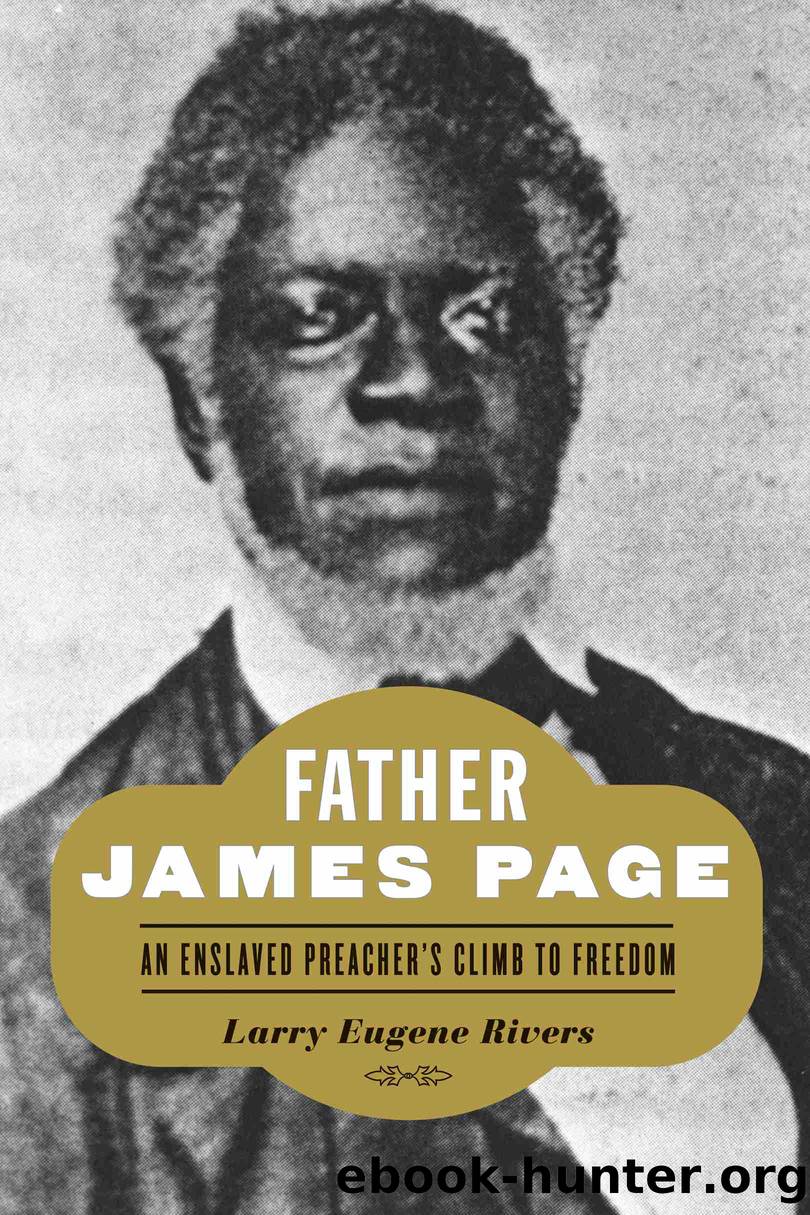Father James Page by Larry Eugene Rivers

Author:Larry Eugene Rivers
Language: eng
Format: epub
Publisher: Johns Hopkins University Press
* * *
Throughout the conflict Page persisted in his responsibilities as a pastor, offering comfort, consoling the aggrieved, baptizing the converted, marrying the hopeful, and interring the dead. If anything, calls upon his pastoral care expanded through the stresses, tragedies, separations, and inconveniences of wartime. The geographical scope of his duties, wartime complications notwithstanding, remained immense. Conditions compelled this range, a circumstance easy to understand given the standing that Page enjoyed at the warâs beginning. Ordained in 1851, he had expanded his work over the decade to include church organization and support in many areas of the Southeast. In the process he earned widespread regard for his contributions and effectiveness not only from fellow bondpeople but also from many whites, including denominational leaders. By 1860, he stood in a unique position for the region, as illustrated by events that occurred in Thomasville, Georgia, on March 18. The townâs principal white Baptist minister, Tennessee native and venerable churchman Rev. William Nowell Chaudoin, broke precedent that day. Chaudoin hosted Pageâs participation in a three-member presbytery for the ordination of white deacons on an equal basis with him and a second white minister. Page preached the serviceâs sermon and administered the charge to the new deacons. âIt was impressive beyond the power of those who saw it to express, or of the reader to conceive, to see that venerable man, Page, his head white with age, and face expressive of manly dignity, and christian humility, and tears, giving advice to his brethren,â a correspondent reported. âYes, brethren, and that not in name, but in reality and feeling, though one of them the owner, perhaps of a hundred slaves.â He added, âIt was new and impressive to see master and slave, under the hands of the same Presbytery, at the same time.â22
Pageâs unique position afforded him latitude to pursue his mission energetically despite wartime dislocations, disruptions, suspicions, and confusion. âI still did some traveling during the War,â he recalled. âI remember traveling and I could see that the Confederacy was using servants every where I went. I remember seeing servants loading and unloading for the Confederates. But I was more interested in doing work for God. I am proud to say that I helped people all over Florida build nice Baptist churches as I traveled during the War.â Accordingly, congregations sprinkled throughout the region proudly retain memories of ties to Father Page. In March 1862, for instance, the Union Baptist Church of Molino in Pensacola received a visit. Six months later, the enslaved preacher returned to Escambia County to assist in the founding of New Hope Primitive Baptist Church in Cantonment. Among other religious visits, Page ventured to Nassau County in July 1864 to assist the establishment of the first black Baptist church in Fernandina. âYou know I still traveled many places to points north, east and west,â he confirmed, âpreaching the word of God and helping to build churches for our Savior.â23
The legacy of Pageâs mission travels during the war extended well beyond church organizations and edifices.
Download
This site does not store any files on its server. We only index and link to content provided by other sites. Please contact the content providers to delete copyright contents if any and email us, we'll remove relevant links or contents immediately.
| United States | Abolition |
| Campaigns & Battlefields | Confederacy |
| Naval Operations | Regimental Histories |
| Women |
In Cold Blood by Truman Capote(3380)
The Innovators: How a Group of Hackers, Geniuses, and Geeks Created the Digital Revolution by Walter Isaacson(3178)
Steve Jobs by Walter Isaacson(2895)
All the President's Men by Carl Bernstein & Bob Woodward(2374)
Lonely Planet New York City by Lonely Planet(2223)
And the Band Played On by Randy Shilts(2202)
The Room Where It Happened by John Bolton;(2156)
The Poisoner's Handbook by Deborah Blum(2136)
The Innovators by Walter Isaacson(2102)
The Murder of Marilyn Monroe by Jay Margolis(2097)
Lincoln by David Herbert Donald(1987)
Being George Washington by Beck Glenn(1940)
A Colony in a Nation by Chris Hayes(1928)
Under the Banner of Heaven: A Story of Violent Faith by Jon Krakauer(1803)
Amelia Earhart by Doris L. Rich(1694)
The Unsettlers by Mark Sundeen(1687)
Dirt by Bill Buford(1672)
Birdmen by Lawrence Goldstone(1666)
Zeitoun by Dave Eggers(1648)
